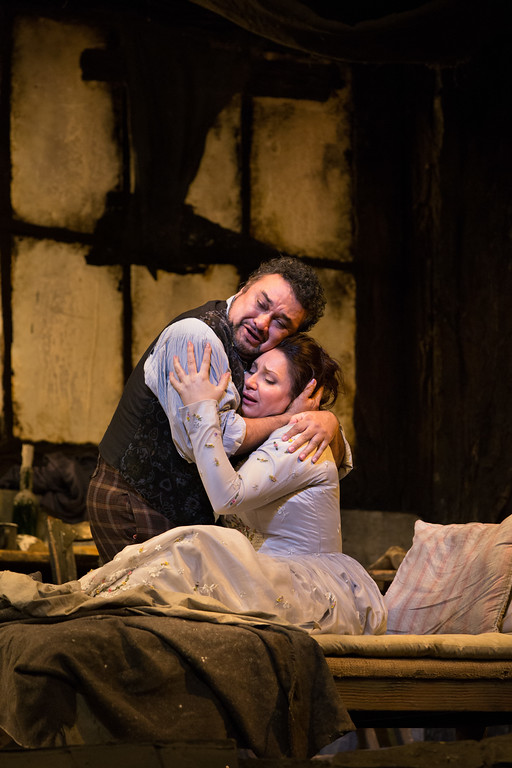Met’s “Bohème” provides warmth and comfort in a harsh world

Ramon Vargas and Barbara Frittoli in the Metropolitan Opera production of Puccini’s “La Bohème.” Photo: Marty Sohl
In the current harsh, unsettling landscape of religio-political barbarism, it’s understandable to seek relief more than ever in the cultural equivalent of comfort food. And few shows provide as much of a psychological safe haven as Franco Zeffirelli’s beloved production of Puccini’s La Bohème, which opened Monday night at the Metropolitan Opera.
In the wake of the Paris terror attacks earlier this month, even an opera as familiar as this–set in the City of Light–seemed to take on new meaning beyond young love and tuberculosis. The waving of the large tricolor at the jubilant coda of Act 2 now seems infused with extra resonance, feeling like a defiant statement of solidarity with France. One looks back nostalgically at a time when the worst one had to fear in Paris was poverty, difficult relationships and annoying landlords.
Local operagoers tend to be sniffy about the sumptuous Zeffirelli staging. But it is an undeniably beautiful production, from the postcard winter scene of Act 3 to the eye-popping tableau of Cafe Momus, complete with Musetta making her entrance in horse-drawn carriage.
Vocally, this first season performance of the Met’s box-office insurance show proved more uneven and took half the night to find its footing.
As Rodolfo, Ramon Vargas was not at his best opening night, sounding dry of tone with underprojected singing and a cloudy, covered quality to his voice. The tenor managed a serviceable “Che gelida manina” yet had a jarring crash and burn in “O soave fanciulla.” Vargas sang more securely after the first intermission and characterized solidly, though this was not exactly Puccini singing for the ages.
Barbara Frittoli’s slender soprano didn’t emerge clearly in the early going either but her singing and sensitive portrayal of the delicate seamstress Mimi went from strength to strength in each act. She was ardent and luminous in Act 3 and rose to the tragic final scene with a radiant and affecting performance, which elicited more than the usual sniffles in the house Monday night.
Ana Maria Martinez was a worthy Musetta, nicely sympathetic in the final scene though more hard-edged than charming in Act 2 with a wavering vibrato in “Quando me’n vo’.”
Levente Molnar as Marcello provided the most consistent vocalism of the evening. Making his house debut, the Romanian baritone was a big, gruff bear of a painter singing with dark, ample tone yet also showing lyric grace and nobility in his duets with Frittoli and Vargas.
Christian Van Horn brought deeper and more focused expression to Colline’s adieu to his outerwear than one usually hears. Alexey Lavrov was a light-footed dancing master of a Schaunard. John Del Carlo mostly skirted cartoonish cliches as Benoit/Alcindoro.
Conductor Paolo Carignani directed the score efficiently, keeping the action moving while drawing elegant, glowing string tone from the Met musicians.
La Bohème runs through December 12. Maria Agresta and Bryan Hymel will perform the lead roles for most of the January and April performances with Susanna Phillips and Ailyn Perez as Musetta and Quinn Kelsey and Levente Molnar as Marcello. Metopera.org